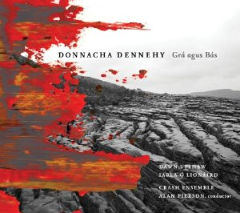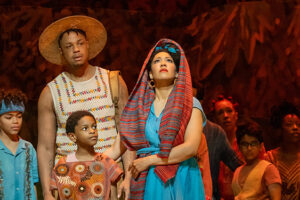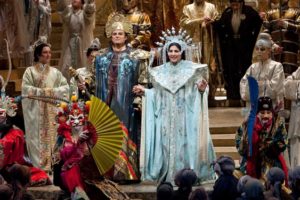
One of the many pleasures of reviewing CDs and DVDs is the discovery of an unfamiliar composer whose works are original, fascinating, and moving. Such is the case with Irish composer Donnacha Dennehy, and his new Nonesuch CD
of the concert piece “Gra agus Bas” (Love and Death) and a 6-song cycle entitled “That the Night Come,” set to poems by the wonderful W. B. Yeats.
“Gra agus Bas” is Dennehy’s exploration of the Irish tradition of “Sean-nos”, ornamented vocal music, usually unaccompanied, that is handed down orally from generation to generation. One of Sean-nos’ major exponents, Iarla O Lionaird, provides the vocals here of pure-toned and plaintive clarity. Dennehy sets this 25-minute piece with an original, inventive, almost spectral harmonic world utilizing traditional Irish instruments combined with modern.
The music pulses and shimmers behind O Lionard’s ecstatic sounds; it feels modern but at the same time primitive in its distinctly Irish feel, invoking a sense both of the rocky shoreline and also the constant presence of the sea in the Irish national spirit. This piece simply must be experienced rather than described. This music has a deeply visceral and emotional impact from beginning to end, and holds the listener rapt throughout. The playing of the Crash Ensemble, conducted by Alan Pierson, is ravishing.
I was moved again by “That the Night Come”, commissioned and sung by American soprano Dawn Upshaw. The six Yeats poems are a perfect fit for Dennehy’s haunting music and Upshaw’s voice. Sometimes there was a certain sameness of approach by Upshaw and a few self-indulgent ornamentations that occasionally broke the hypnotic spell of Dennehy’s rich score.
Still, the emotional landscape of the sound reflects Yeats’ sense of longing for the unattainable and his personal passions, his restless energy and his sometime desperation. Upshaw still has a lovely, silvery-toned voice, even throughout the registers and especially pure at the top of her range. “The Old Men Admiring Themselves in the Water” particularly touched me as Upshaw and Dennehy gave a very emotional reading of the final lyrics:
I heard the old, old men say,
“All that’s beautiful drifts away
Like the waters.”
It is a simple, eloquent, poignant musical moment. Also moving was “Her Anxiety”:
All true love must die,
Alter at the best
Into some lesser thing
Prove that I lie.
Donnacha Dennehy is giving us startlingly fresh and original music here. I highly recommend this new CD. Listeners will be richly rewarded by the strange, mystical, mysterious harmonics created by this gifted composer.
In the same package with the Dennehy CD came a 2-CD recording of William Michael Balfe’s 1857 ballad opera The Rose of Castile, recorded by an organization called the Comic Opera Guild in concert in November of 2010. This is a slight if melodically interesting piece, here accompanied by two pianos. The English language libretto by August Glossop Harris and Edmund Falconer is perfectly silly, as is the plot concerning Queen of Leone’s efforts to marry the Prince of Castile in order to unite their thrones. There are the expected use of disguise (the Queen dresses as a peasant girl to test the Prince’s love) and buffoonish villains.
The music has its charms and occasional delights, but they’re hard to find in this concert format. Here, there is a narrator explaining the plot in order to help the audience understand the story without any staging. Unfortunately, the written narration spoken by George Valenta is terribly precious and twee, and his delivery does not help the situation.
I find it terribly hard to find very many positives from this recording. The women fare better than the men. Soprano Karin White in the title role has a rich middle and lower voice and manages some nice expressivity in phrasing, but even she tends to the shrill and wiry on top. Tenor Kevin Newell as Manuel simply doesn’t have the high notes for this role, consistently lunging for them and falling short of pitch and forced to early cutoffs. The baritones in the villain roles are wobbly, gruff of tone, and frequently flat.
Conductor (and director) David Troiano leads an uneven performance that feels terribly under-rehearsed. The chorus is all over the map and almost never together; the piano playing is ragged, and nobody seems to have decided whether to use British dialects or not. Not one of the singers manages to be believable in the spoken dialogue—it all sounds like a pretentious group of college English majors attempting to act.
The Rose of Castile was quite popular in its day, though never so much as Balfe’s 1843 piece The Bohemian Girl. The liner notes to this CD call it the “first full score recording.” I think this score deserves better, and I should like to hear the piece in more competent hands.
























Comments